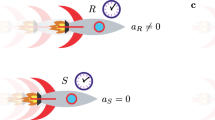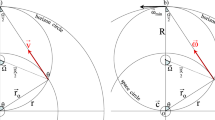Abstract
IN Nature of January 5 (p. 35), Dr. Frank S. Crawford, jun., asserts that Einstein's theory of relativity predicts an “asymmetrical ageing” of twins who separate and reunite, and cites experiments which he regards as verifying the prediction. He states also that “the ‘twin paradox’ is not even qualitatively discernible in any experiment that does not involve relative accelerations”. Dr. Crawford had previously kindly sent me another account of this work to which I replied briefly in a postscript to an article which I was then writing1.
This is a preview of subscription content, access via your institution
Access options
Subscribe to this journal
Receive 51 print issues and online access
$199.00 per year
only $3.90 per issue
Buy this article
- Purchase on Springer Link
- Instant access to full article PDF
Prices may be subject to local taxes which are calculated during checkout
Similar content being viewed by others
References
Bull. Inst. Phys., 7, 314 (1956).
Proc. Phys. Soc. Lond., A, 69, 925 (1956).
Nature, 178, 680 (1956).
Author information
Authors and Affiliations
Rights and permissions
About this article
Cite this article
DINGLE, H. The ‘Clock Paradox’ of Relativity. Nature 179, 865–866 (1957). https://doi.org/10.1038/179865a0
Issue Date:
DOI: https://doi.org/10.1038/179865a0
This article is cited by
-
Einstein dynamics without special-relativistic kinematics
Foundations of Physics (1980)
-
Relativity and Space Travel
Nature (1957)
Comments
By submitting a comment you agree to abide by our Terms and Community Guidelines. If you find something abusive or that does not comply with our terms or guidelines please flag it as inappropriate.



